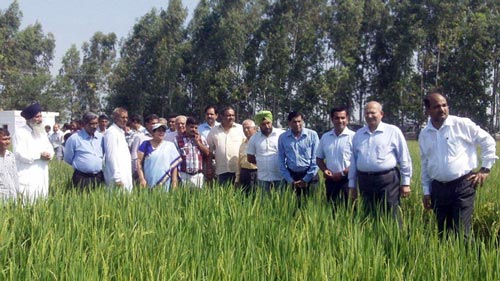 While cereal production in India has increased significantly since the mid-1960s as a result of the Green Revolution, securing the gains achieved is becoming more difficult in the context of soaring food and fuel prices, volatile markets, depleting water resources, soil degradation, and the effects of global climate change. To discuss strategies for improving efficiency and resilience of farming systems as a way to ensure sustainable food security, over 400 participants gathered for an in-field stakeholder meeting on ‘Empowering Farmers for Climate Smart Agricultural Practices in Haryana’ in Taraori, Karnal, India, on 28 September 2012. The event was organized by the CGIAR Research Program on Climate Change, Agriculture and Food Security (CCAFS), Haryana Farmers’ Commission (Government of Haryana), Haryana Department of Agriculture, Indian Council of Agricultural Research (ICAR), Directorate of Wheat Research (DWR), Central Soil Salinity Research Institute (CSSRI), CCS Haryana Agricultural University (HAU), CIMMYT, Cereal Systems Initiative for South Asia (CSISA), and Farmers Cooperative. Among the participants were Indian farmers, 50 officials from governmental and private sector organizations, and 25 scientists from national and international institutions. RS Paroda, Chairman of Haryana Farmers Commission, urged farmers to stay connected with scientists, extension agents, and government officials while modifying agricultural practices for adaptation and mitigation of climate change. He suggested that diversification from conventional rice-wheat rotation to new technologies, such as direct seeded rice, zero tillage, residue management, and raised bed planting, and alternative crops to rice is necessary for sustainable agriculture. By quoting Pandit Jawaharlal Nehru, late Prime Minister of India, who said “In order to awaken the people, it is the women who have to be awakened. Once she is on move, the family moves, the village moves, and the nation moves,” he stressed the importance of empowering female farmers. Paroda further highlighted the importance of regional and global networks and partnerships for knowledge sharing and enhanced capacity development.
While cereal production in India has increased significantly since the mid-1960s as a result of the Green Revolution, securing the gains achieved is becoming more difficult in the context of soaring food and fuel prices, volatile markets, depleting water resources, soil degradation, and the effects of global climate change. To discuss strategies for improving efficiency and resilience of farming systems as a way to ensure sustainable food security, over 400 participants gathered for an in-field stakeholder meeting on ‘Empowering Farmers for Climate Smart Agricultural Practices in Haryana’ in Taraori, Karnal, India, on 28 September 2012. The event was organized by the CGIAR Research Program on Climate Change, Agriculture and Food Security (CCAFS), Haryana Farmers’ Commission (Government of Haryana), Haryana Department of Agriculture, Indian Council of Agricultural Research (ICAR), Directorate of Wheat Research (DWR), Central Soil Salinity Research Institute (CSSRI), CCS Haryana Agricultural University (HAU), CIMMYT, Cereal Systems Initiative for South Asia (CSISA), and Farmers Cooperative. Among the participants were Indian farmers, 50 officials from governmental and private sector organizations, and 25 scientists from national and international institutions. RS Paroda, Chairman of Haryana Farmers Commission, urged farmers to stay connected with scientists, extension agents, and government officials while modifying agricultural practices for adaptation and mitigation of climate change. He suggested that diversification from conventional rice-wheat rotation to new technologies, such as direct seeded rice, zero tillage, residue management, and raised bed planting, and alternative crops to rice is necessary for sustainable agriculture. By quoting Pandit Jawaharlal Nehru, late Prime Minister of India, who said “In order to awaken the people, it is the women who have to be awakened. Once she is on move, the family moves, the village moves, and the nation moves,” he stressed the importance of empowering female farmers. Paroda further highlighted the importance of regional and global networks and partnerships for knowledge sharing and enhanced capacity development.
CIMMYT senior agronomist ML Jat emphasized the importance of the principles of conservation agriculture, as they could considerably contribute to arresting the natural resource degradation and to increased farm profitability. PK Aggarwal, CCAFS South Asia coordinator, discussed how current farming practices are partially responsible for climate change and what needs to be done. For example, conventional puddled rice cultivation utilizes standing water which is a major source of methane gas emissions. Therefore, new rice production technologies are necessary. Other participants, including Indu Sharma (Director, DWR Karnal), DK Sharma (Director, CSSRIKarnal ), BS Duggal (Additional Director Agriculture, Government of Haryana), and Sain Dass (President, Indian Maize Development Association) discussed the use of groundwater recharge, gypsum, salt tolerant varieties, the provision of subsidized and/ or free seeds by the Government of Haryana to promote diversification in intensive systems, introduction of maize to replace rice in certain areas, and conservation agriculture practices. Kaushik Majumdar (Director, International Plant Nutrition Institute – South Asia) also mentioned that Nutrient Expert, an excellent tool for site-specific nutrient management for crop yield optimizations and environmental footprint reduction, has been developed and validated in Haryana in collaboration with CIMMYT.
 Climate adaptation and mitigation
Climate adaptation and mitigation 
